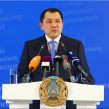
Kazakh Language Comes into Its Own
Publication: Eurasia Daily Monitor Volume: 10 Issue: 200
By:

A press conference by a regional leader in Kazakhstan, unsurprisingly, seldom attracts much attention. But a recent such press briefing by Nurlan Nogayev, the akim (governor) of the Western Kazakhstan Oblast, has drawn significant notice and may prove to be a turning point in the nationalization of Kazakhstani political life. Akim Nogayev’s press conference, moreover, appears to be yet another indication that Kazakhstan is not about to become the subordinate Eurasian ally that some in Moscow hope to use to deepen the Russian-dominated Customs Union into a broader Eurasian Union. That makes Nogayev’s performance especially noteworthy given Ukraine’s moves toward Europe and Belarusian problems with Russia.
Last week (November 1), Russian expert Dmitry Verkhoturov, one of the closest observers of Central Asia, noted that Nogayev’s October 16 press conference at the Central Communications Service of the President of the Republic of Kazakhstan had already “become an event in several respects” by virtue of its unprecedented quality. It has thus “acquired significance” for the entire country, he noted. Verkhoturov gives three reasons for what might seem at first glance to be such a sweeping conclusion (verkhoturov.info/content/view/1351/1/).
First, and this is probably “the most important” the analyst says, “Nogayev gave his entire report and answered all questions” in Kazakh rather than in Russian, something that Dulata Abibullayeva of Kazakhstan Television, who has taken part in “more than 50 [such] briefings,” said had never happened before. Additionally, Mukhtar Kaldarbayev, a photographer for the Kazinform news agency, noted that Nogayev’s Kazakh-language remarks were especially impressive because they demonstrated the richness of his vocabulary and underscored that the Kazakhstani official was not simply going through the motions.
Because Kazakhstan has so many ethnic Russians—they were a plurality in the population only a generation ago—and because Kazakhs were forced to learn Russian in Soviet times, most members of the Kazakhstani leadership speak Russian better than their state language. Indeed, in many cases, Verkhoturov points out, they use it only “ritually,” at the beginning or end of speeches. But Nogayev used it all the way through his press conference and in a natural way.
According to Verkhoturov, “if even half of Kazakhstan’s officials followed [Nogayev’s] example, the use of the government language [Kazakh] would experience a decisive revolution.” All citizens, including many ethnic Russians, would have to study the language in order to keep up with official pronouncements. Those who did not do so almost certainly would feel isolated and many of them would likely try to leave Kazakhstan, thereby increasing the share of ethnic Kazakhs in the population.
But more than that, Verkhoturov continues, those living across the border in Russia would also have to study and use Kazakh if they were to succeed in integrating the two countries. That is very unlikely to happen, at least anytime soon. And consequently—like with the events in Ukraine and Belarus—the unwillingness of Russian officials to make such accommodations will make any move beyond the Customs Union either impossible or one that will be defined, at least in part, by what the non-Russians like the Kazakhs want. That is not what Vladimir Putin has been hoping for.
The second reason that Nogayev’s performance was important, Verkhoturov says, is that he delivered it without a pre-prepared text but with confidence and many references to specific figures. That suggests not only that this akim is in complete command of the situation in what has been a troubled part of the country, at least in terms of information about it, but that Astana may use Nogayev as a standard by which to judge other regional governors. If that happens, and Verkhoturov strongly suggests it will, other akims will have to master the Kazakh language and the nuts and bolts of political and economic life in their areas or face dismissal. At the very least, such requirements will almost certainly freeze out ethnic Russians or overly Russianized Kazakhs from such positions.
And third, Nogayev strongly suggested in his report that he has overseen a dramatic improvement in the economy of his region, in both the gas production and processing and agricultural sectors, and that consequently the labor unrest of the past several years in Western Kazakhstan is likely a thing of the past. That may be too optimistic a projection given that the akim’s own approach, Verkhoturov implies, may cut off the branch that he has been sitting on: If his use of Kazakh and his political skills lead to a nationalization of Kazakhstan’s politics, then Nogayev’s oblast may not be able to continue to import more from Russia than it exports, and thus may face labor troubles again.
A conflict, therefore, exists between the imperatives of an increasingly Kazakh Kazakhstan and the continued importance to that country of the Russian market, which is needed both to sell Kazakhstani goods and import products not yet easily available from China or other exporters. The above dynamic is likely to define politics in this Central Asian republic for the next decade—an insight that one would hardly have expected to glean from a local governor’s press conference.




